LIFT Intersects 26 m at 1.56% Li2O at its BIG East pegmatite, Yellowknife Lithium Project, NWT
- Significant intervals of spodumene mineralization
- High-grade lithium assays from drill holes
- Continuity of high-grade spodumene mineralization at BIG East
- Exciting potential for additional strike length to the northeast
- None.
VANCOUVER, British Columbia, Jan. 03, 2024 (GLOBE NEWSWIRE) -- Li-FT Power Ltd. (“LIFT” or the “Company”) (TSXV: LIFT) (OTCQX: LIFFF) (Frankfurt: WS0) is pleased to report assays from 8 drill holes completed at the BIG East, Echo, Shorty, & BIG West pegmatites within the Yellowknife Lithium Project (“YLP”) located outside the city of Yellowknife, Northwest Territories (Figure 1). Drilling has intersected significant intervals of spodumene mineralization, with the following highlights:
Highlights:
| • | YLP-0117: | 26 m at | |
| • | YLP-0129: | 18 m at | |
| including: | 4 m at | ||
| and including: | 5 m at | ||
| • | YLP-0128: | 10 m at | |
| and: | 12 m at | ||
| including: | 5 m at | ||
| • | YLP-0126: | 10 m at | |
| including: | 4 m at | ||
Francis MacDonald, CEO of LIFT comments, “The continuity of high-grade spodumene mineralization at BIG East is really shaping up. Also, we’ve intersected the BIG East system in YLP-0129, which looks like a faulted offset of the pegmatite. This opens up additional strike length to the northeast. Drilling at Echo intersected two dykes > 10 m width that are shallowly dipping; we continue to be excited about the near-surface tonnage potential at Echo.”
Discussion of Results
This week’s drill results are for eight holes drilled on four different pegmatite complexes, with three holes reported from BIG East (YLP-0117, -0127, -0129), two holes each from Shorty (YLP-0119, -0126) and BIG West (YLP-0131, -0132), and one hole from Echo (YLP-0128). A table of composite calculations, general comments related to this discussion, and a table of collar headers are provided towards the end of this section.
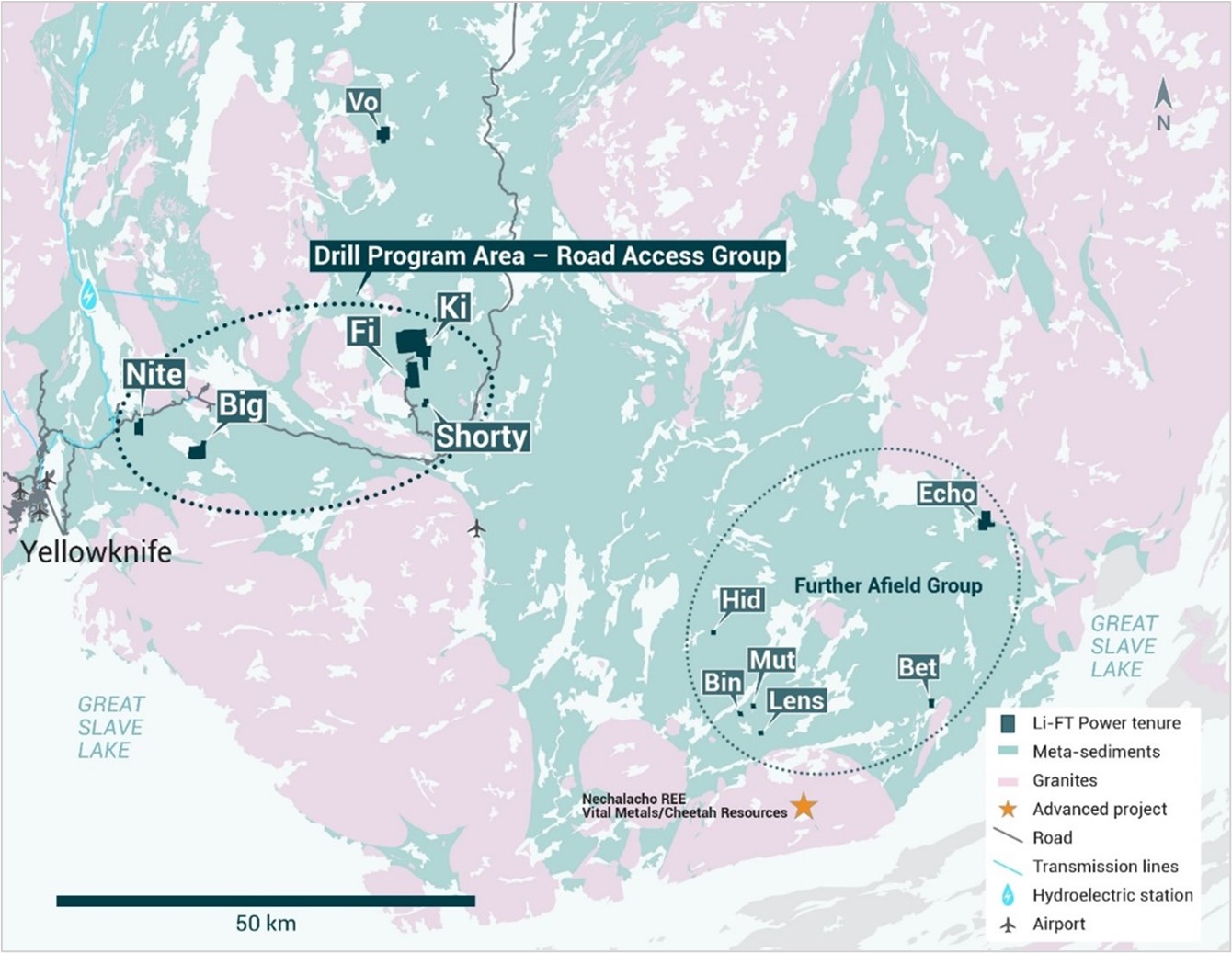
Figure 1 – Location of LIFT’s Yellowknife Lithium Project. Drilling has been thus far focused on the Road Access Group of pegmatites which are located to the east of the city of Yellowknife along a government-maintained paved highway, as well as the Echo target in the Further Afield Group.
BIG East Pegmatite
The BIG East pegmatite complex comprises a corridor of parallel-trending dykes and dyke swarms that are generally north-northeast striking and dipping 55°-75° degrees to the west. The main dyke swarm is exposed for at least 1,300 m of strike length and ranges from 10-100 m wide whereas a smaller swarm, with ~400 m of along-strike continuity, is stepped out 400 m to the north-northwest (NNW) to form an en échelon-like array with the main swarm.
YLP-0117 was designed to test the main swarm in the BIG East corridor, approximately 500 m from its southern mapped extent, and 150 m vertically beneath the surface, as well as 100 m downdip of previously released YLP-0121 (cumulative 34 m of pegmatite averaging
YLP-0127 was drilled on the NNW step-out, approximately 100 m from its northern mapped extent and 50 m vertically beneath the surface. Drilling intersected an 18 m wide pegmatite dyke flanked by two 1-2 m wide dykes to the west, with all dykes returning negligible grades.
YLP-0129 was also drilled on this NNW step-out, approximately 50 m south of YLP-0127, 100 m from its southern mapped extent, and 50 m vertically beneath the surface. Drilling intersected a single 21 m wide pegmatite dyke that returned an assay composite of
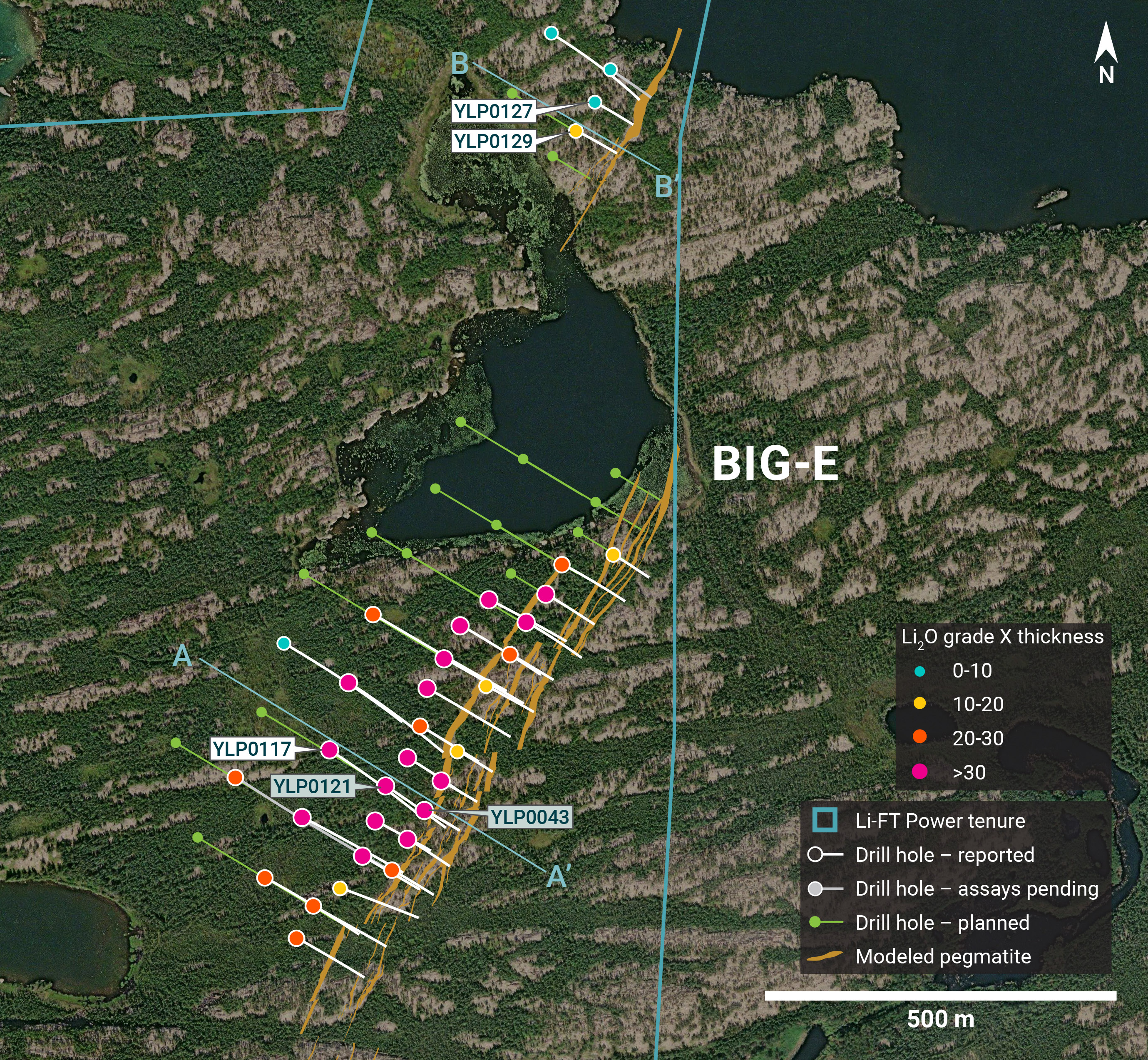
Figure 2 – Plan view showing the surface expression of the BIG East pegmatite with diamond drill holes reported in this press release.
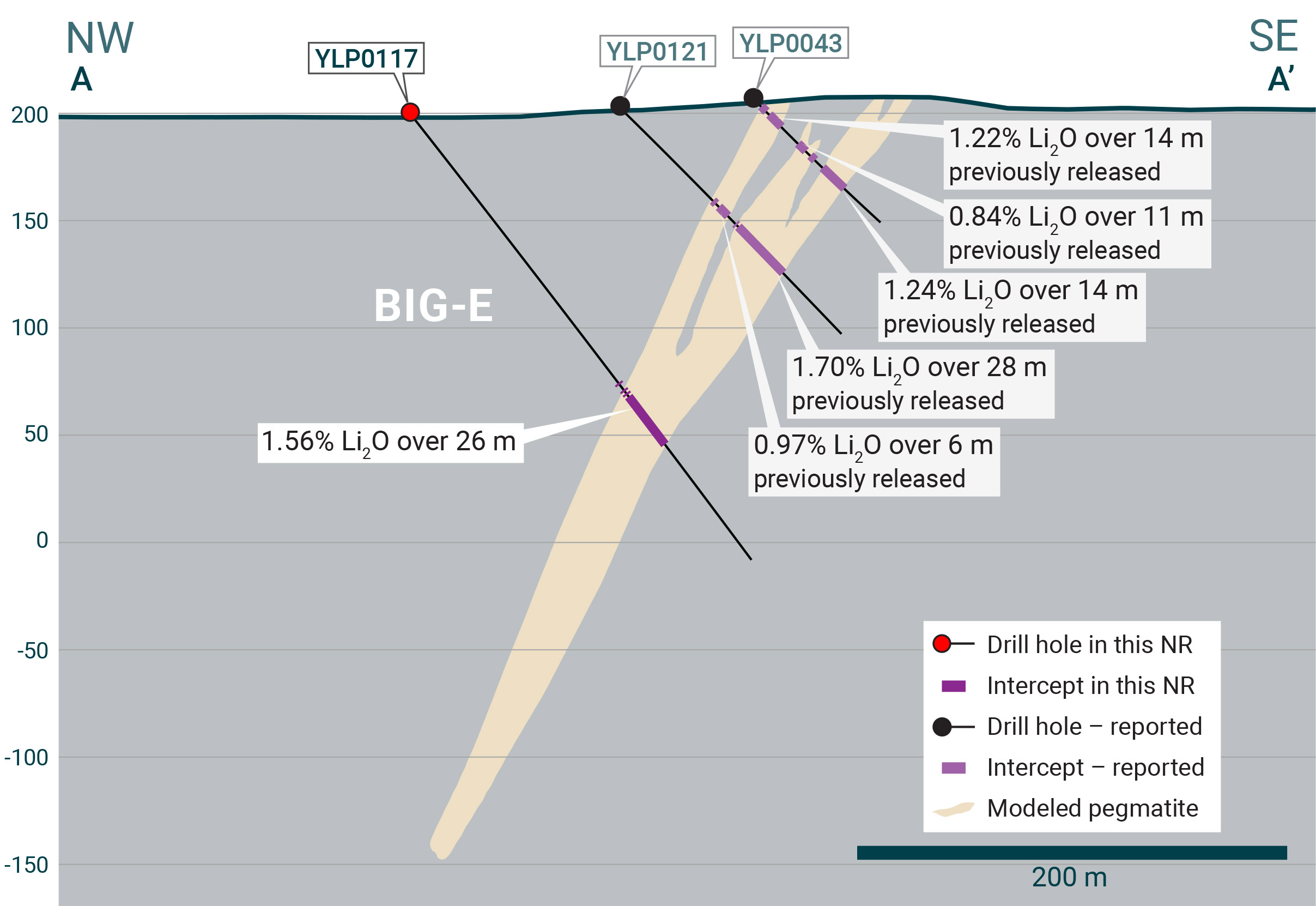
Figure 3 – Cross-section illustrating YLP-0117 with results as shown in the BIG East pegmatite dyke with a 26 m interval of
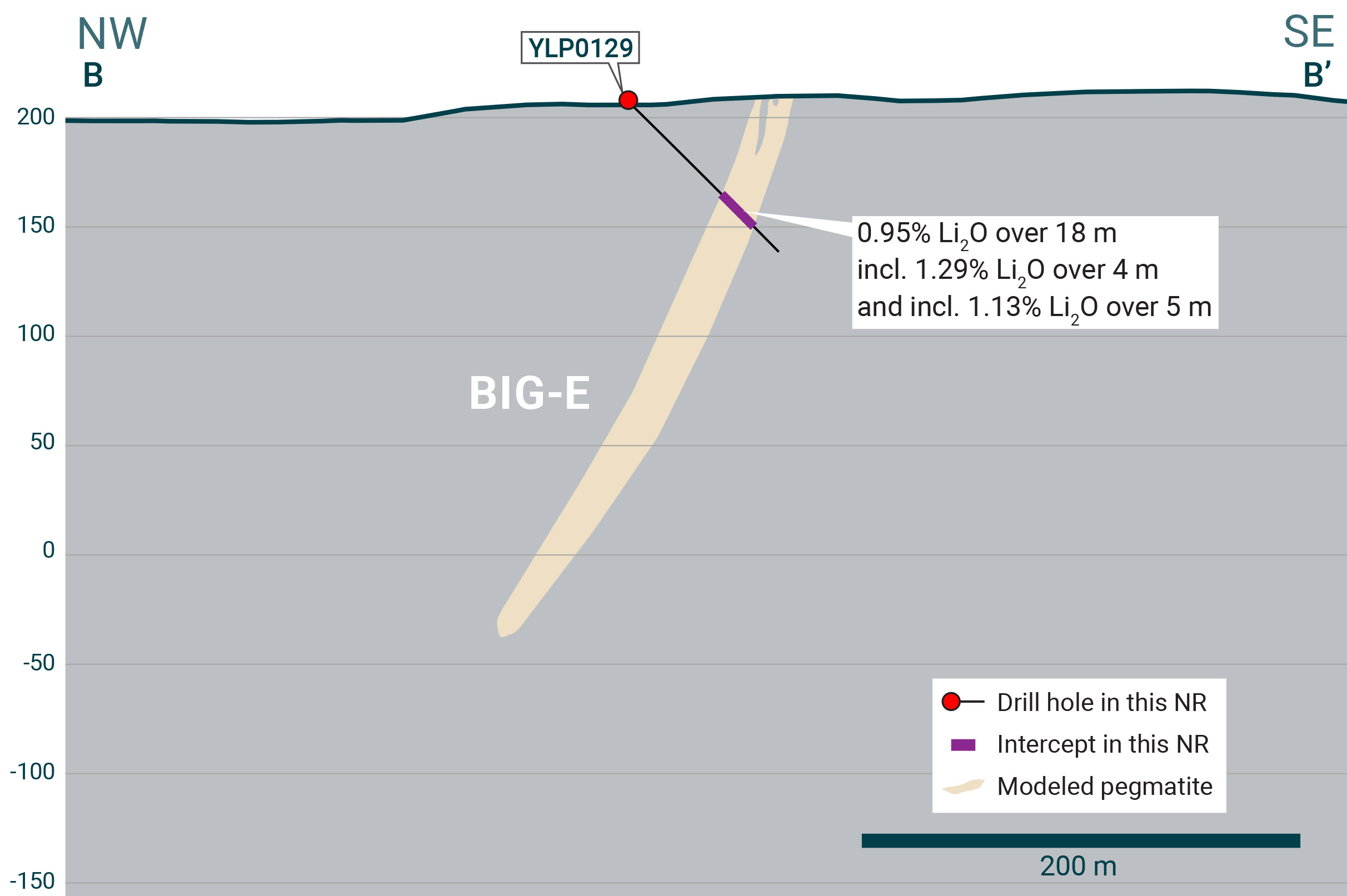
Figure 4 – Cross-section illustrating YLP-0129 with results as shown in the BIG East pegmatite dyke with an 18 m interval of
Echo Pegmatite
The Echo pegmatite complex comprises a north-northwest trending corridor, at least 1,000 m in length and 450 m in width, with numerous trend-parallel and oblique (mostly northwest-trending) dykes. Individual dykes range from gently to steeply east dipping and are up to 25 m wide. The hole described below was collared into a part of the complex comprising three parallel, oblique-striking, and gently dipping pegmatite intervals (upper, mid, lower) that all merge, to the southeast, into a wider, more northwesterly-striking, and more steeply dipping dyke.
YLP-0128 tested the middle and lower dykes approximately 150 m from their northern mapped extent as well as, respectively, <25 m and 50 m vertically beneath the surface. Drilling intersected a 10 m wide middle dyke that returned an assay composite of
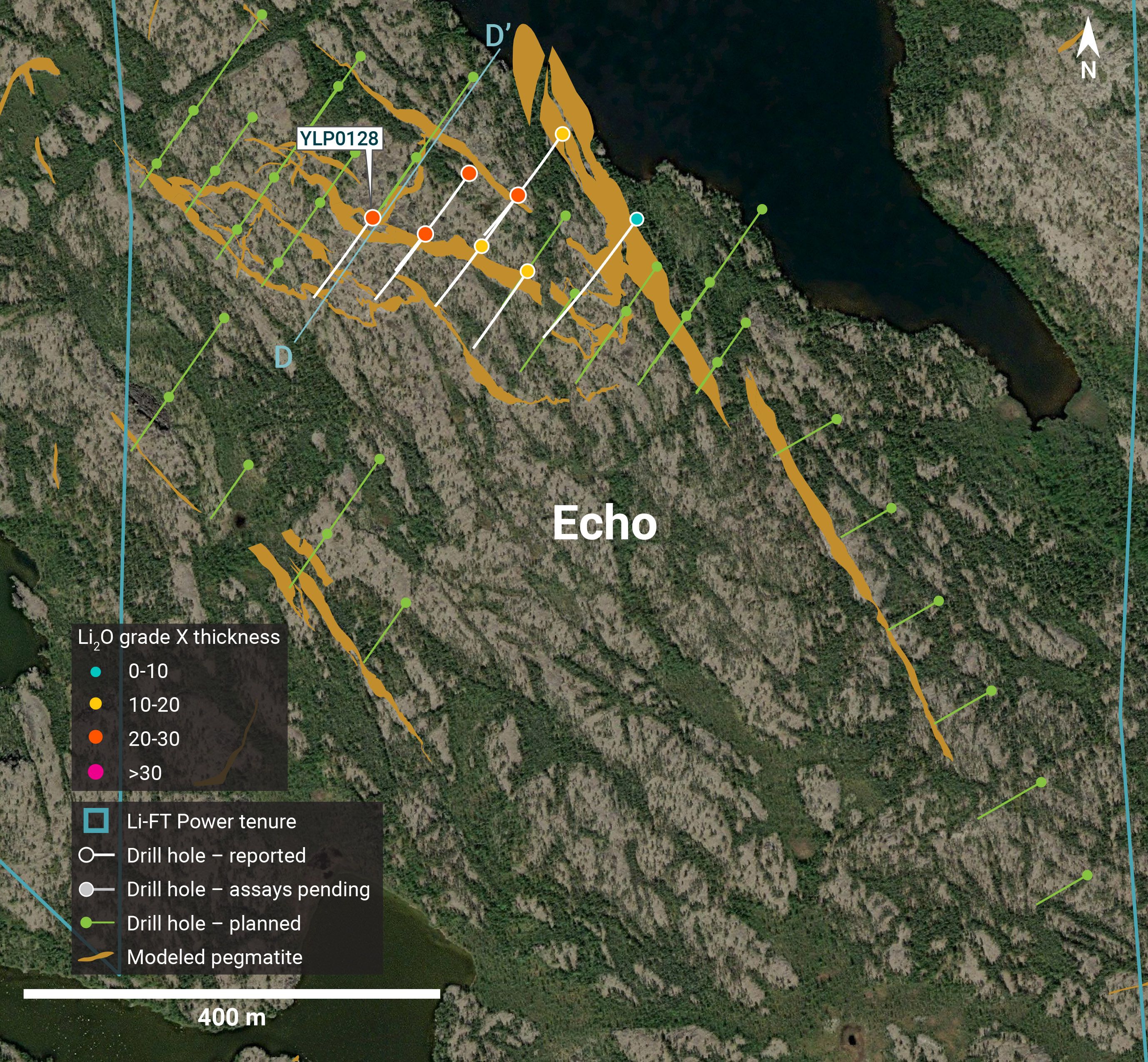
Figure 5 – Plan view showing the surface expression of the Echo pegmatite with diamond drill holes reported in this press release.
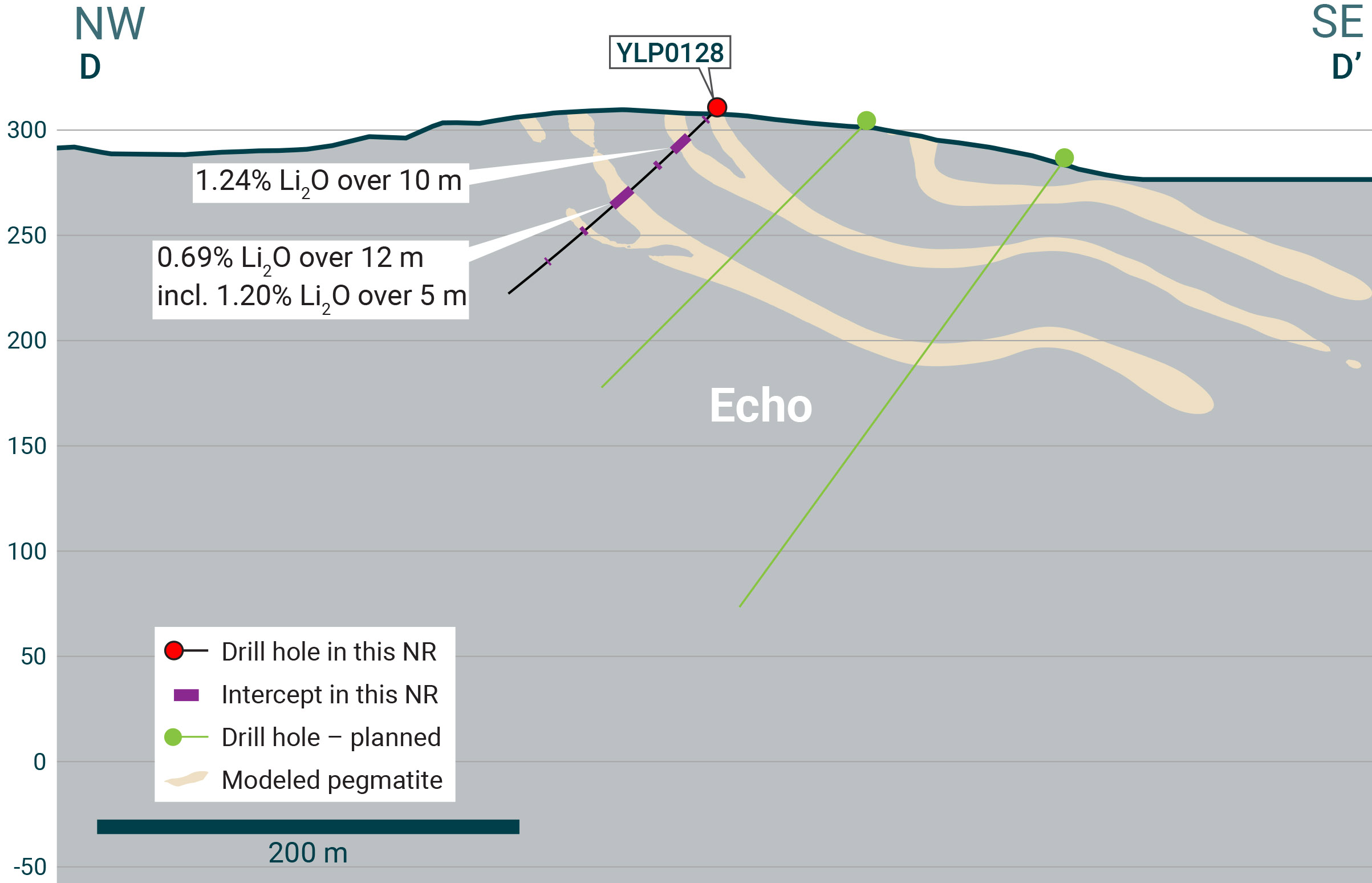
Figure 6 – Cross-section of YLP-0128 which intersected the Echo pegmatite dyke with a 10 m interval of
Shorty Pegmatite
The Shorty pegmatite is one of several dykes occurring within a north-of-northeast striking corridor. Drill intercepts of Shorty show that it in some places it is formed by a single 10-25 m wide dyke whereas elsewhere it comprises 2-4 dykes with a similar cumulative width spread over 40-95 m of core length. The pegmatite is visible for at least 700 m on surface and dips 50°-70° to the west-northwest.
YLP-0119 was designed to test the Shorty pegmatite approximately 300 m from its northern mapped extent and 200 m vertically beneath the surface, as well as 50 m downdip of YLP-0040 (
YLP-0126 was designed to test the Shorty pegmatite just 100 m from its southern mapped extent and 25 m vertically below the surface. Drilling intersected a 12 m wide pegmatite flanked by several 4 m wide dykes on either side, for cumulative pegmatite width of 28 m over 77 m of drill core. Assays from the thickest dyke returned a composite of
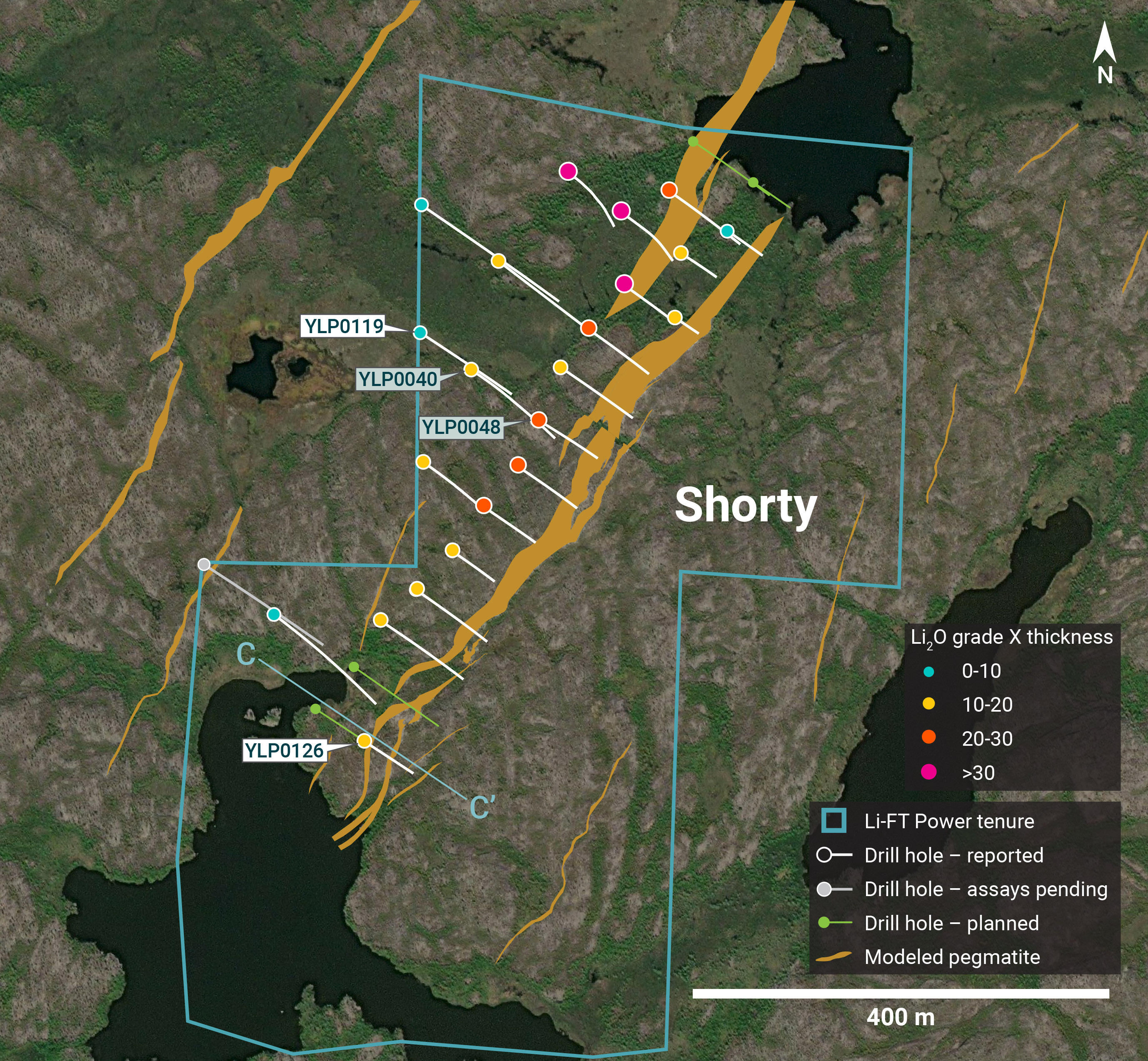
Figure 7 – Plan view showing the surface expression of the Shorty pegmatite with diamond drill holes reported in this press release.
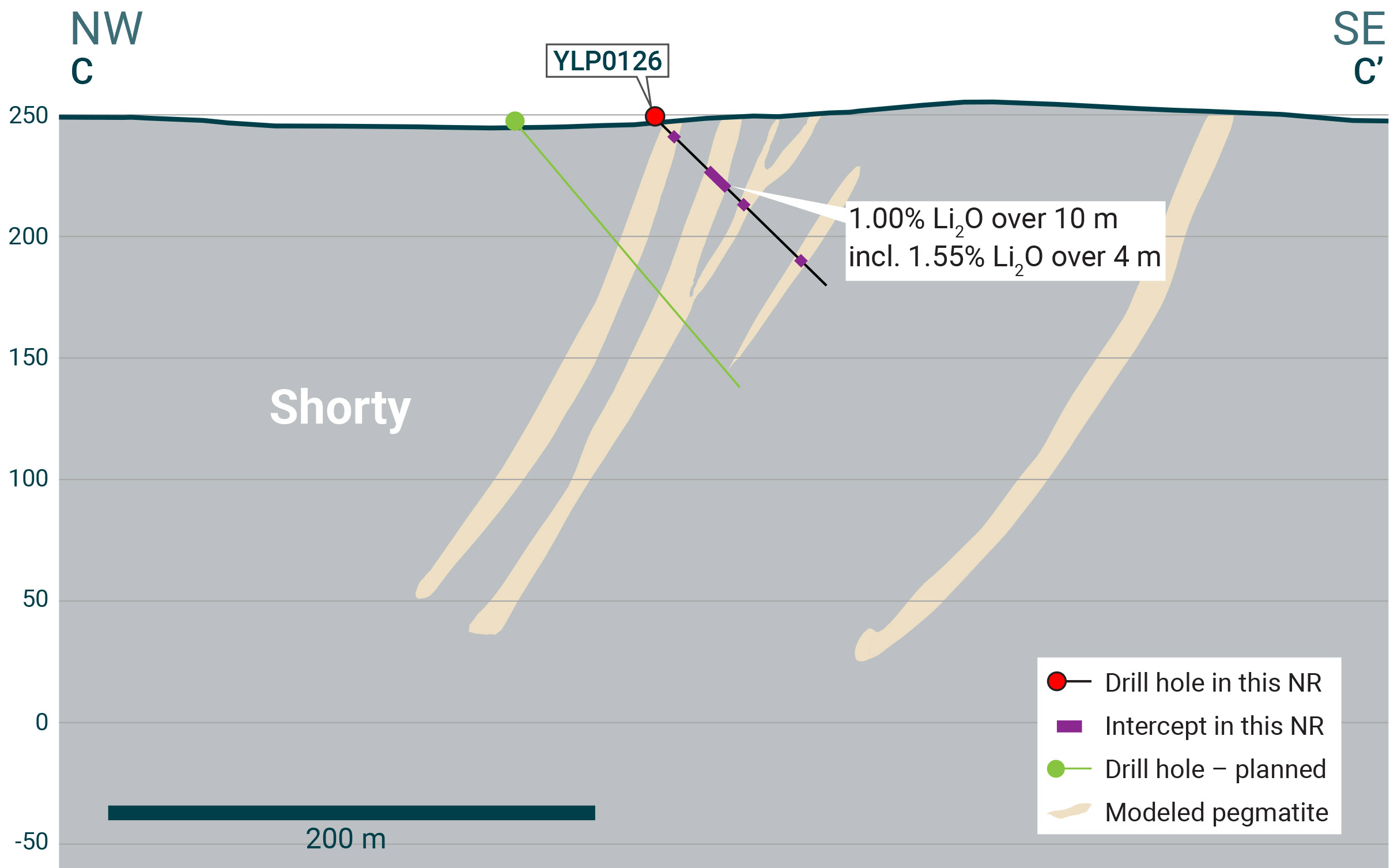
Figure 8 –Cross-section of YLP-0126 which intersected the Shorty pegmatite dyke with a 10 m interval of
BIG West Pegmatite
This news release provides results for the first two holes drilled on the BIG West pegmatite complex, which comprises a northeast-trending corridor of parallel-trending dykes. This corridor is exposed for at least 1,500 m along strike and ranges from 70-150 m in width.
YLP-0131 tested the BIG West pegmatite approximately 150 m from its southern mapped extent and 150 m vertically below the surface. Drilling intersected a single 7 m wide pegmatite dyke that returned
YLP-0132 was collared 200 m due north of YLP-0131 to test the BIG West pegmatite approximately 350 m from its southern mapped extent and 150-200 m vertically beneath the surface. Drilling intersected 2 m and 15 m wide pegmatite dykes between 208-232 m core depth, with both dykes returning negligible grades (Table 1 and 2, Figure 9).
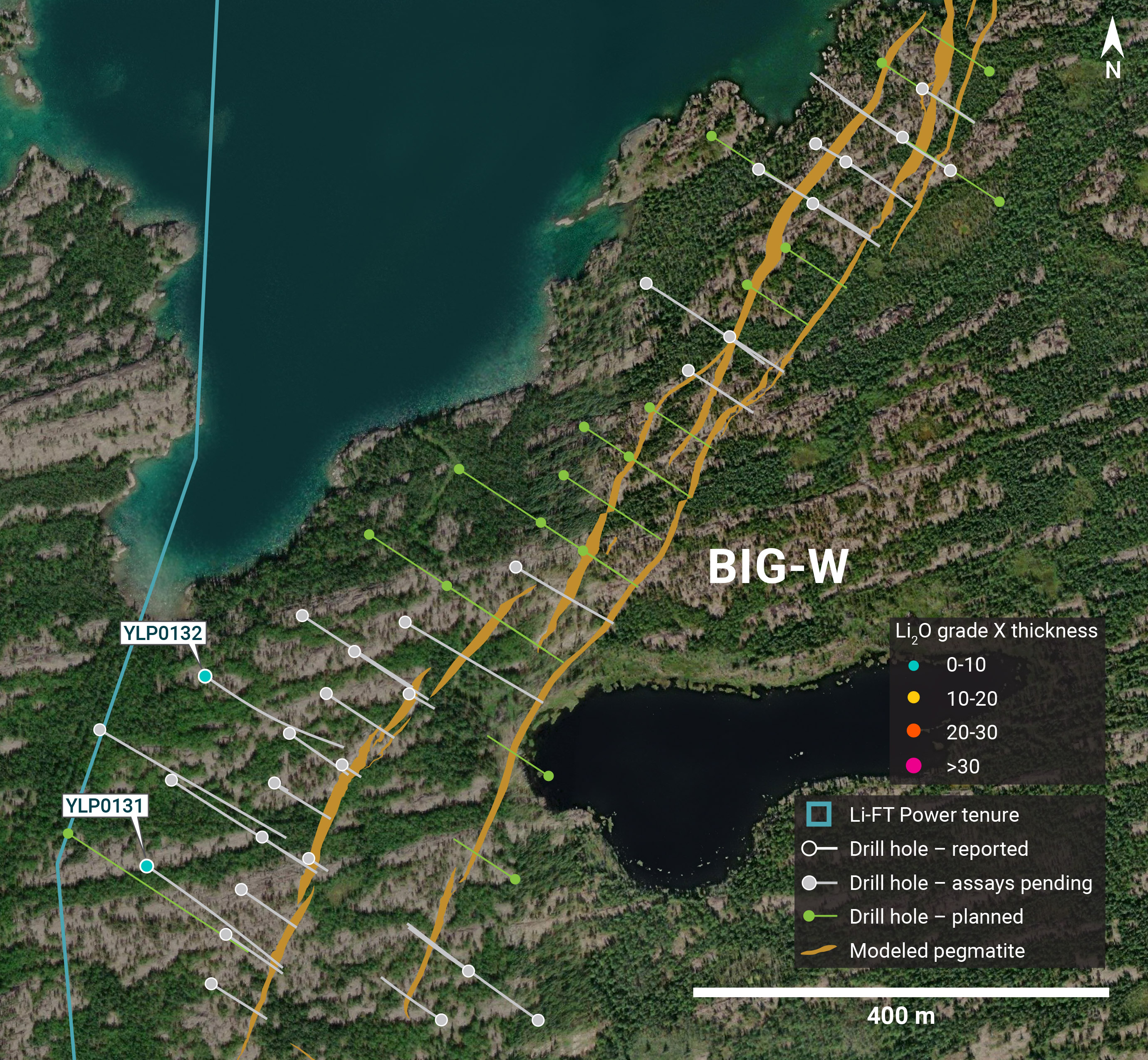
Figure 9 – Plan view showing the surface expression of the BIG West pegmatite with diamond drill holes reported in this press release.
Table 1 – Assay highlights for drill holes reported in this press release.
| Hole No. | From (m) | To (m) | Interval (m) | Li2O% | Dyke | |
| YLP-0117 | 164 | 190 | 26 | 1.56 | BIG East | |
| YLP-0119 | No significant results | Shorty | ||||
| YLP-0126 inc | 29 | 39 | 10 | 1.00 | Shorty | |
| 31 | 35 | 4 | 1.55 | Shorty | ||
| YLP-0127 | No significant results | BIG East | ||||
| YLP-0128 and inc | 15 | 25 | 10 | 1.24 | Echo | |
| 52 | 64 | 12 | 0.69 | Echo | ||
| 53 | 58 | 5 | 1.20 | Echo | ||
| YLP-0129 inc and inc | 59 | 77 | 18 | 0.95 | BIG East | |
| 59 | 63 | 4 | 1.29 | BIG East | ||
| 66 | 71 | 5 | 1.13 | BIG East | ||
| YLP-0131 inc | 186 | 193 | 7 | 0.50 | BIG West | |
| 188 | 190 | 2 | 1.26 | BIG West | ||
| YLP0132 | No significant results | BIG West | ||||
Drilling Progress Update
The Company has concluded its 2023 drill program at the Yellowknife Lithium Project with 34,238 m completed. Currently, LIFT has reported results from 132 out of 198 diamond drill holes (23,264 m).
General Statements
All eight holes described in this news release were drilled broadly perpendicular to the dyke orientation so that the true thickness of reported intercepts will range somewhere between 65
Mineralogical characterization for the YLP- pegmatites is in progress through hyperspectral core scanning and X-ray diffraction work. Visual core logging indicates that the predominant host mineral is spodumene.
Table 2 - Drill collars table of reported drill holes in this press release
| Drill Hole | Easting | Northing | Elevation (m) | Azimuth (°) | Dip (°) | Depth (m) | Dyke |
| YLP-0117 | 345,877 | 6,933,033 | 205 | 120 | 52 | 260 | BIG East |
| YLP-0119 | 372,722 | 6,938,177 | 248 | 123 | 69 | 291 | Shorty |
| YLP-0126 | 372,672 | 6,937,784 | 248 | 123 | 45 | 96 | Shorty |
| YLP-0127 | 346,254 | 6,933,956 | 213 | 118 | 45 | 92 | BIG East |
| YLP-0128 | 439,108 | 6,922,644 | 310 | 215 | 45 | 129 | Echo |
| YLP-0129 | 346,227 | 6,933,915 | 211 | 120 | 45 | 95 | BIG East |
| YLP-0131 | 653,544 | 6,932,965 | 204 | 118 | 45 | 236 | BIG West |
| YLP-0132 | 653,582 | 6,933,152 | 202 | 118 | 48 | 257 | BIG West |
QA/QC & Core Sampling Protocols
All drill core samples were collected under the supervision of LIFT employees and contractors. Drill core was transported from the drill platform to the core processing facility where it was logged, photographed, and split by diamond saw prior to being sampled. Samples were then bagged, and blanks and certified reference materials were inserted at regular intervals. Field duplicates consisting of quarter-cut core samples were also included in the sample runs. Groups of samples were placed in large bags, sealed with numbered tags in order to maintain a chain-of-custody, and transported from LIFT’s core logging facility to ALS Labs (“ALS”) laboratory in Yellowknife, Northwest Territories.
Sample preparation and analytical work for this drill program were carried out by ALS. Samples were prepared for analysis according to ALS method CRU31: individual samples were crushed to
Qualified Person
The disclosure in this news release of scientific and technical information regarding LIFT’s mineral properties has been reviewed and approved by Ron Voordouw, Ph.D., P.Geo., Partner, Director Geoscience, Equity Exploration Consultants Ltd., and a Qualified Person as defined by National Instrument 43-101 Standards of Disclosure for Mineral Projects (NI 43-101) and member in good standing with the Northwest Territories and Nunavut Association of Professional Engineers and Geoscientists (NAPEG) (Geologist Registration number: L5245).
About LIFT
LIFT is a mineral exploration company engaged in the acquisition, exploration, and development of lithium pegmatite projects located in Canada. The Company’s flagship project is the Yellowknife Lithium Project located in Northwest Territories, Canada. LIFT also holds three early-stage exploration properties in Quebec, Canada with excellent potential for the discovery of buried lithium pegmatites, as well as the Cali Project in Northwest Territories within the Little Nahanni Pegmatite Group.
For further information, please contact:
| Francis MacDonald Chief Executive Officer Tel: + 1.604.609.6185 Email: info@li-ft.com Website: | Daniel Gordon Investor Relations Tel: +1.604.609.6185 Email: investors@li-ft.com www.li-ft.com |
Cautionary Statement Regarding Forward-Looking Information
Certain statements included in this press release constitute forward-looking information or statements (collectively, “forward-looking statements”), including those identified by the expressions “anticipate”, “believe”, “plan”, “estimate”, “expect”, “intend”, “may”, “should” and similar expressions to the extent they relate to the Company or its management. The forward-looking statements are not historical facts but reflect current expectations regarding future results or events. This press release contains forward looking statements. These forward-looking statements and information reflect management's current beliefs and are based on assumptions made by and information currently available to the company with respect to the matter described in this new release.
Forward-looking statements involve risks and uncertainties, which are based on current expectations as of the date of this release and subject to known and unknown risks and uncertainties that could cause actual results to differ materially from those expressed or implied by such statements. Additional information about these assumptions and risks and uncertainties is contained under "Risk Factors and Uncertainties" in the Company's latest annual information form filed on March 30, 2023, which is available under the Company's SEDAR+ profile at www.sedarplus.ca, and in other filings that the Company has made and may make with applicable securities authorities in the future. Forward-looking statements contained herein are made only as to the date of this press release and we undertake no obligation to update or revise any forward-looking statements whether as a result of new information, future events or otherwise, except as required by law. We caution investors not to place considerable reliance on the forward-looking statements contained in this press release.
Neither the TSX Venture Exchange nor its Regulation Services Provider (as that term is defined in the policies of the TSX Venture Exchange) accepts responsibility for the adequacy or accuracy of this news release.








